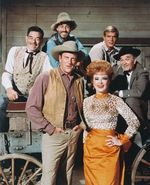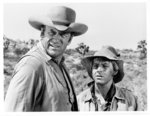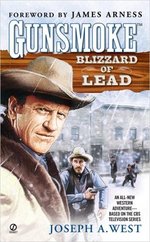 New York Daily News columnist David Bianculli celebrates 50 years of GUNSMOKE, which was the best western and the longest-running primetime episodic drama in TV history. LAW & ORDER is catching up to GUNSMOKE’s 20-year run, but it doesn’t really count. The cast of LAW & ORDER has turned over many times, but three of the four stars of GUNSMOKE stuck with it for 19 years (Dennis Weaver left in the mid-60s and Amanda Blake skipped the 20th season). James Arness as Matt Dillon became a television icon. But what really made the show work, from day one, was the writing.
New York Daily News columnist David Bianculli celebrates 50 years of GUNSMOKE, which was the best western and the longest-running primetime episodic drama in TV history. LAW & ORDER is catching up to GUNSMOKE’s 20-year run, but it doesn’t really count. The cast of LAW & ORDER has turned over many times, but three of the four stars of GUNSMOKE stuck with it for 19 years (Dennis Weaver left in the mid-60s and Amanda Blake skipped the 20th season). James Arness as Matt Dillon became a television icon. But what really made the show work, from day one, was the writing.
"Gunsmoke" premiered Sept. 10, 1955, and began with a shocker. A
quick-draw gunfighter comes to town, resists arrest by a pursuing
lawman who has traced him to Dodge City, and guns him down.Marshal Dillon, upholding the law, accepts the gunman’s challenge of a
daytime duel. Saloon girl Miss Kitty (Amanda Blake), deputy Chester
(Dennis Weaver) and town physician Doc (Milburn Stone) watch as their
friend takes aim – and is outgunned and shot down. Cut to commercial.This was five years before Alfred Hitchcock stunned moviegoers by
killing off the heroine in "Psycho." (Retroactive, 45-year-old spoiler
alert!) Matt Dillon didn’t die, but he did have to recuperate slowly,
nursed back to health by his loyal buddies before facing the villain
again.It was a stunning, mature approach to the Western, showing right from
the start that the good guys didn’t always win, that violence had
consequences and that the badge often carried a crushing weight.
Unlike some shows, which get worse with age, GUNSMOKE was actually at its best in its last few years, using the age and bitter experience of the characters as poignant and powerful undercurrents in the sharp, surprisingly edgy and violent stories. That’s not to say GUNSMOKE didn’t sink into a rut (the mid-60s especially), but even the black-and-white, half-hour episodes from the 50s still pack a surprising punch. Suzanne Barabas, author of "GUNSMOKE: A Complete History" notes in an interview:
undercurrents in the sharp, surprisingly edgy and violent stories. That’s not to say GUNSMOKE didn’t sink into a rut (the mid-60s especially), but even the black-and-white, half-hour episodes from the 50s still pack a surprising punch. Suzanne Barabas, author of "GUNSMOKE: A Complete History" notes in an interview:
When John Meston and Norman MacDonnell created "Gunsmoke," they wrote
down every single cowboy cliche they could think of, and decided to
break every single one, Barabas said. The irony, she said, was
"Gunsmoke" itself became a cliche.
Speaking of GUNSMOKE, I finally got around to reading Ben Costello’s "GUNSMOKE: An American Institution." It’s a handsome hardcover packed with photos and interviews. Is it worth $75? No. It’s a breezy, enjoyable book with lots of interesting anecdotes but it doesn’t compare to Suzanna & Gabor Barabas’ monumental "GUNSMOKE: A Complete History," one of the best books ever written about a TV show (and also one of the most expensive at $85).
If you’re going to buy one of the books, I’d spend the extra ten bucks and go for the Barabas book. Of the two, the Barabas book is also far more scholarly and informative, Costello’s is more fannish and superficial (though he does offer many more pictures and some intriguing details about the subsequent GUNSMOKE movies, which aren’t covered in the Barabas book).
Other articles celebrating the show and marking its anniversary are here, here and here.
 UPDATE (9-10-05) I almost forgot…my friend Joseph West’s latest original GUNSMOKE novel, BLIZZARD OF LEAD, just came out. I haven’t read it yet, but if it’s anything like the first one, BLOOD BULLETS AND BUCKSKIN, it’s a great read that’s also true to the spirit of the show and perfectly captures the voices of the beloved characters.
UPDATE (9-10-05) I almost forgot…my friend Joseph West’s latest original GUNSMOKE novel, BLIZZARD OF LEAD, just came out. I haven’t read it yet, but if it’s anything like the first one, BLOOD BULLETS AND BUCKSKIN, it’s a great read that’s also true to the spirit of the show and perfectly captures the voices of the beloved characters.

The radio show was, in my opinion, superior to the TV version. I believe they were produced at the same time, with William Conrad supplying the voice for Matt Dillon.
Conrad made a tougher, more realistic Dillon. It was a beautifully written and produced show.
The show was filmed on a ranch my grandfather ran in the fifties to late sixties. I believe it was called the American-Hawaiian Land Ranch. The 20,000acres in Thousand Oaks has now been converted to a golf course and housing development.